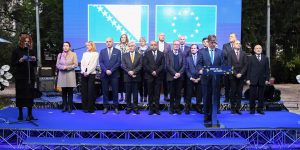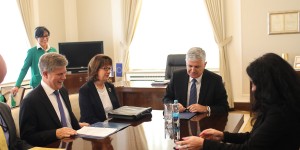This interview was originally published in the daily Nezavisne novine on 18 July 2015
If it were shown that only Serbs are being tried, then this should be remedied for it was never anyone’s intention, said Lars-Gunnar Wigemark, Head of the EU Delegation to BiH. “If it were shown that this is the outcome, then it must be corrected. Everyone must be equal before the law and there must be no doubt about it. But the referendum cannot solve this issue”, stressed Wigemark. He added that the EU sanctions against politicians violating the Dayton Accord are still on the table, but that their activation is currently not under consideration. “It is important to discuss these issues. There is a lot of misunderstanding here. I haven’t received any instructions from Brussels not to talk to someone”, said Wigemark.
The issue that generates the whole referendum story is a conviction shared by many Serbs that senior Bosniak leaders are not being tried for war crimes …
Anyone who committed a war crime must be held accountable, regardless of ethnic or any other background. And that is the position of the EU. Official statistics show that at the end of 2014, there were 1,063 war crimes cases pending, of which 649 cases before the state and 414 at the entity level and the Brcko District level. We see that there are plenty of cases at the entity level, so the focus should not only be at the state level. And this was the same issue raised when the referendum was discussed back in 2011. The-then High Representative, Catherine Ashton, visited Banja Luka and met with Mr. Dodik. And we went with the Structured Dialogue on the Judiciary. The Dialogue may not have been as successful as we hoped, but it did achieve certain results. Even President Dodik recently agreed with me that there has been progress in reducing the number of war crimes cases considering that in 2013, there were about 1,300 cases.
Many of those I meet daily believe that the state judiciary was established so as to create conditions to abolish or weaken RS based on the judgements of the ICTY on genocide in Srebrenica and joint criminal enterprise.
It is of paramount importance that all are treated equally and that there is no double standard. If it turned out that the state judiciary was prosecuting only Serbs, it would be wrong. It has never been anyone’s intention. If it were shown that this is the outcome, then it must be corrected. Everyone must be equal before the law and there must be no doubt about it. But the referendum cannot solve this issue. The issue of prosecuting war crimes cannot be solved in this way. In order to support processing of war crimes, the EU has granted nearly 15 million Euros. We agree that there are problems with the state judicial institutions, but the dissatisfaction of the citizens is also there because, for example, corruption cases. People rarely report corruption for they doubt that the courts would ever deal with it. Many are in fear that they themselves will be sued if they report corruption.
RS citizens have the right to know what they can expect and whether there will be sanctions as a result of the referendum. The US Embassy issued a rather harsh statement, mentioning even the isolation of RS.
That’s a very good question, but the answer should come from those who voted in favour of the referendum. A professor of constitutional law in Banja Luka told me it was just a survey, a public opinion poll. But the opinion of citizens can already be guessed – there is dissatisfaction with the work of the judiciary. So if it is known, why then go ahead with the referendum? We are now running the risk of chain reaction of various unforeseen events. The EU has made clear that this directly calls into question the sovereignty and integrity of Bosnia and Herzegovina and it is something that goes beyond RS itself as it involves state institutions. Why then call a referendum in only one entity? The problem is also in the way in which the referendum question is phrased. You cannot ask people whether they think that something is unconstitutional. Politicians should explain why they think it is unconstitutional, and then this issue should be discussed. The Constitution of BiH can be changed when there is consent of all three constituent peoples. It is also likely that BiH will have to change its Constitution on its path towards the accession. It has happened before and it is nothing unusual. Early this year, we launched the agenda for economic and social reforms, as agreed by all political leaders. This agenda includes issues related to the judiciary and the rule of law, but it does not deal with the entire legal system of the country, including the Dayton arrangement of Bosnia and Herzegovina. The goal of the agenda is to focus on economic issues for a better life of citizens, instead of dealing with the major legal issues.
Now that you mentioned the agenda – will it be possible to address the issue of the referendum and at the same time deal with the agenda? Or would the agenda have to wait to first resolve the referendum issue?
Our sense is that the referendum opens a Pandora’s Box and that is why it has caused such deep concern both within the country and abroad. We are constantly trying to keep a lid on the box, but someone is persistently reopening the box, and keeps taking us back to issues of the Dayton setup. There is no doubt that this is an important question, but it is now turning the attention away. We therefore sincerely hope that we can continue to work with the Reform Agenda and that the issues which all political parties and all political leaders had agreed on, including those in Republika Srpska, would be pursued with the focus on economic and social reforms. But six months later, RS leaders are again bringing us back to legal issues. Why now? Could it not wait for some other time? The story of the referendum distracts the attention and energy from economic and social issues and puts it back on the legal issues of the country’s setup. These are certainly issues that deserve the attention of the people, but it seems to us that people are currently most interested in economic and social issues.
In 2011, the EU adopted a possibility of introducing sanctions for our local politicians, which could be passed in consultation with the Head of the EU Delegation. Are these sanctions still on the table and can these be activated?
Yes, this decision is still in force and it means that the EU may resort to restrictive measures against anyone whom we believe to be in violation of fundamental rules and regulations such as the constitutional issues and the Dayton arrangement. But we do not wish to use such measures, unless it is necessary. We believe it is still too early to talk about sanctions, and that now is not the time to discuss such measures.
Are you going to continue talks with the RS leaders? Are there any new meetings planned to overcome this situation and reduce tensions?
In the past week, I had many meetings with the RS leaders and I think it is important to continue the dialogue. It is important to talk about these issues. There is a lot of misunderstanding here. I haven’t received any instructions from Brussels not to talk to someone.
What is your take on the Potočari incident and the whole aftermath?
It is good that there was a responsible reaction both from Bosnia and Herzegovina and Serbia. On his return, Prime Minister Vucic clearly said he will continue his policy of reconciliation. The good news is that the Presidency is to go to Belgrade and continue the dialogue. We have clearly condemned all that had happened. I was there, although I did not see exactly what happened, it is nevertheless clear that there has been a security lapse. No VIP should have ever been taken straight into a crowd of people at such a delicate moment, full of emotional charge. I personally believe that security was inadequate at the cemetery. The EU expects an investigation into the case. It was very brave of Mr. Vucic to enter the area. It was not easy for any guest to enter the area, with people emotional due to the burial of the victims of this terrible genocide.



